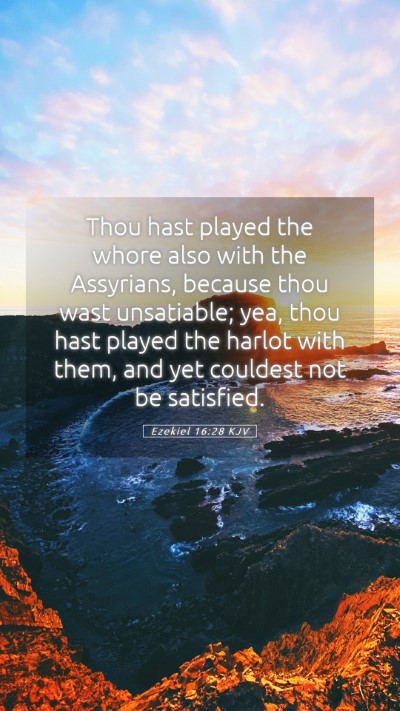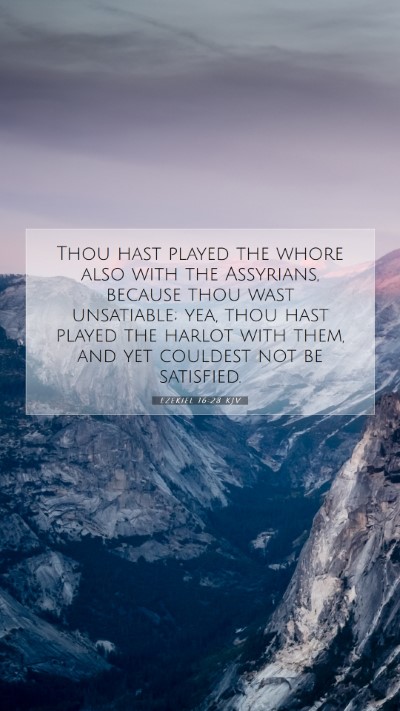Ezekiel 16:28 - Bible Verse Meaning and Commentary
Ezekiel 16:28 states: "Thou hast played the whore also with the Assyrians, because thou wast unsatiable; yet thou hast played the harlot with them, and yet couldst not be satisfied." This verse highlights Israel's infidelity to God and her pursuit of alliances with neighboring nations instead of trusting in the Lord.
Understanding the Context
This verse is part of a broader allegorical narrative where God, through the prophet Ezekiel, likens Jerusalem to an unfaithful wife. The spiritual adultery exemplified in this metaphor reveals Israel's betrayal of God, as she sought fulfillment and security in foreign relationships, particularly with the Assyrians.
Biblical Exegesis
The term "played the whore" or "infidelity" is a powerful metaphor used throughout Scripture to describe unfaithfulness to God. In this context, it signifies Israel's idolatry and reliance on worldly powers, reflecting a deeper spiritual corruption.
Insights from Public Domain Commentaries
-
Matthew Henry:
Henry emphasizes the severity of God's charge against Jerusalem. He notes the relentless pursuit of alliances with the Assyrians, where instead of satisfying their needs through God’s providence, they sought worldly connections that ultimately left them empty and unsatisfied.
-
Albert Barnes:
Barnes points out that the term "unsatiable" reflects mankind's relentless quest for fulfillment apart from God. This reflects the tears of God over His people's choices to seek help from nations that were not their own, illustrating a spiritual void caused by rejecting divine assistance.
-
Adam Clarke:
Clarke elaborates on the consequences of such idolatrous relationships, suggesting that Israel’s discontent led to further moral degradation. He connects these events to the larger narrative of Israel's dependence on God being replaced by reliance on foreign nations, illustrating a profound spiritual and national crisis.
Application and Relevance
The significance of Ezekiel 16:28 extends beyond historical context, offering a meaningful lesson for contemporary believers. It prompts us to evaluate our own dependence on worldly solutions rather than steadfast faith in God's promises.
As individuals and communities, we may find ourselves pursuing 'alliances' with modern 'Assyrians'—influences that promise satisfaction but ultimately lead us away from our spiritual integrity. This reflection encourages believers to reconsider their priorities and trust in God's plan for fulfillment.
Cross References
- Jeremiah 2:20 - The metaphor of Israel's infidelity in breaking God's covenant.
- Ezekiel 23:5-10 - An elaboration on the harlotry of Jerusalem and Samaria.
- Isaiah 30:1-3 - Warning against reliance on Egypt instead of trusting in God.
Final Thoughts
Ultimately, understanding Ezekiel 16:28 sheds light on the profound spiritual implications of misplaced trust. It invites believers to engage in diligent Bible study through various Bible study tools and resources, seeking to apply the lessons from Scripture to our daily lives. The challenges of understanding difficult Bible passages can be overcome with thoughtful Bible study lessons and the support of Bible study groups.
Encouragement for Study
Engaging deeply with verses such as Ezekiel 16:28 helps us improve our Bible study understanding, enhances our Scripture analysis, and equips us with the insights needed to address both historical contexts and contemporary applications. As we delve further into biblical exegesis, let our hearts remain open to the lessons awaiting us in the Scriptures.


